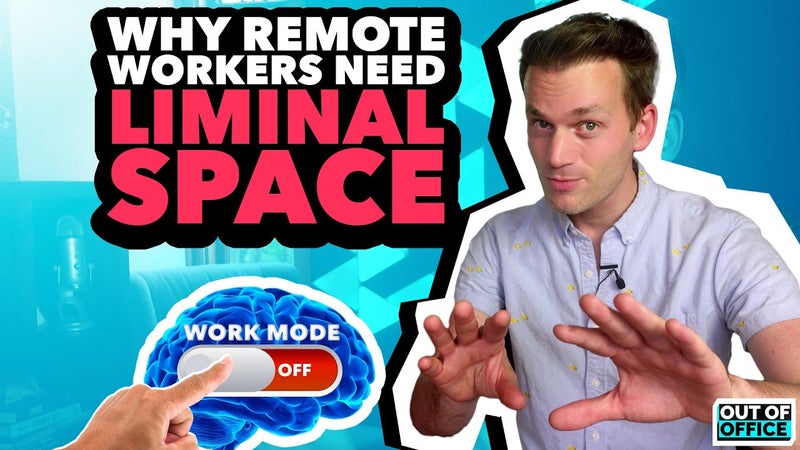Contents
- Hey, Welcome Back!
- Study: Commuting Helps Your Mental Health
- Liminal Space: Why Remote Workers Need It
- Blurring The Lines
- Actively Adding Liminal Space
- 5 Ways to Practice Liminal Space
- This Week’s Shareable
- Latest Remote Jobs
This study claims: yes! And it points to something missing from your daily remote work routine. Could this be the reason you can't switch from work to home mode?
🚌 The Conversation: The Benefits of Your Commute
🌀 Liminal Space: This is What You’re Really Missing
🧠 Switching Modes: 5 Ways to Practice Liminal Space
Hey, Welcome Back!
This week I slow things down and reflect on mental health.
It’s so easy to get stuck in frantic work mode, right? Recently, a cyclone flooded my new house (twice) and reminded me that the most important thing of all – is taking a moment to breathe.
Without mental health we can’t do much.
So, episode 26 this week looks at a fascinating study on a concept all remote workers should know about: liminal space.
I’m going to chat about it and show you how to use it to switch from work to home mode, every day. Your brain – and boss – will thank you!
Let’s get on the details –
Study: Commuting Helps Your Mental Health
I came across this intriguing conceptual study as I was wading through the latest research on mental health and remote work.
It was based on the psychological benefits of commuting.
Not something you usually hear about travelling to the office!
During COVID, several journalists reported that people were missing their hours-long commute. People who’d never experienced rush hour in New York or Tokyo, I bet.

📝 The study argues that commuting is good for mental health, and remote workers are missing out on something essential.
The authors, Matthew Piszczek and Kristie McAlpine say that instead of seeing the commute as a chore, or a waste of time – it performs a vital function.
“As management scholars who study the interface between peoples’ work and personal lives, we sought to understand what it was that people missed when their commutes suddenly disappeared.”
And what had vanished was: liminal space.
It’s a type of purgatory that happens between work and home. A space between ‘what was’ and ‘what is next.’
🔄 This transitional space is being studied for its mental health benefits.
So, the time that people spend commuting has trained their brains to switch modes – which is a major stress buster.
Liminal Space: Why Remote Workers Need It
Let’s put aside the studies that have proven how much people hate commuting. This one shows it destroys job satisfaction and this one says it lowers quality of life. Let’s also forget about the mountain of evidence that proves remote work is great for mental health.
The authors are really onto something here.
❌ Not with the idea that commuting is beneficial
✔️ But with the idea that remote workers lack liminal space in their day
At the core of this issue is the separation between work and home.
Blurring The Lines
Back in the 60’s, during the time of office buildings and Mad Men, Don Draper would leave his wife in the kitchen every day to go to work. There was no email, no smartphones, and no home computers.
👔 / 🏡 The office and the home were very different places.
💼 The only way he could bring work home was in a suitcase.
When I lived in New York more than one person told me not to move to Midtown. “You’ll never leave the office,” they would say. Being close to my office was seen as something that would lead to more work.

Look at the culture in Silicon Valley. They’ve spent millions making workplaces feel like home. You can find everything from a cooked dinner and onsite gym, to better snacks than you have in your own fridge.
Why would you want to leave?
Here’s what we know:
😕 Changing workplaces to feel more like home leads to more work
😟 Our homes are changing to be more like workplaces
If we never learn to switch gears correctly, we may suffer from:
⚠️ Role blurring
🥵 Increased stress
🔥 Burnout
The authors say it’s vital to implement two psychological processes:
☝ Detachment
✌️ Recovery
So, how do remote workers make that switch from work mode to home mode?
Actively Adding Liminal Space
When you can set your own hours, you can end up working a lot. I’ve somehow chosen not to take a public holiday off in two years!
🦥 But bringing back the commute is a lazy solution.
There are far better ways we can use this knowledge to improve our lives. The important thing is that we now know that not actively creating liminal space can put us on a path to poor wellbeing.
That doesn’t mean remote work is innately bad for mental health. It just means it requires a different operating manual to get right.
The media loves to portray the quintessential remote worker as lonely, pajama-wearing hermits, but most of us are the exact opposite!
Successful remote workers are super self-disciplined, and they naturally create intentional habits that manage the work / home separation.
Here’s how you can too!
5 Ways to Practice Liminal Space
1) Take Breaks
No, actually take them!
Robert Pozen from MIT Sloan School of Management says throw away the idea that you have to take a certain number of breaks every day. That’s not the best way to stay productive, because everyone’s different.
Instead, find the period of concentrated work that is possible before you need to take a break. Then take breaks as you need them before you get distracted or tired.
🤩 How much concentrated work can you do before you get distracted?
⏳ Take a break right after that

Read! His book ‘Extreme Productivity’ is a classic and will help you accelerate your impact.
2) Work 90 / Rest 20
Another author, Chris Bailey, talks about optimal break time. As a rule of thumb, he says that for every 90 minutes worked, you need 20 minutes of downtime. So, someone working a 9-5 would need just under 2 hours to decompress.
It explains why people came to use their commute as an opportunity for liminal space. One of the best things about remote work is that you’re not trapped in an office.
Instead of jamming all of your breaks into a lump sum after dark, you can spread them out throughout the day.
🌿 Water the garden
🐩 Walk the dog
☕ Meet your friend for a quick chat

Read! Chris Bailey’s book ‘Hyperfocus’ has a lot of excellent tips for boosting productivity.
3) Create Social Time
The next thing you’ll want to do is actively supplement your social time. Contrary to popular belief, remote work isn’t less social, it’s differently social. And it’s weird that society expects you to spend so much time with people from work.
As a remote worker you can drastically improve your mental health by spending time with people you want to be around – friends, family and your community.
Socializing less with people from work doesn’t make you Shrek. But it does require active participation and intention.

👨👩👧👦 Spend time with friends and family
⛳ Join clubs and community centers
🏘️ Get to know your neighbors
4) Normalize Asynchronous Replies
While asynchronous communication is a great habit, the price of entry is normalizing replies that don’t happen right away. Different time zones mean that you’re going to see emails, chats and work threads when you’re watching a movie, eating dinner or spending time with a loved one.
By setting boundaries for yourself, you teach others its okay to have them too. Tell people that you don’t expect instant replies outside of working hours. Tell them that they can make judgement calls when you’re not around to keep work moving forward. No-one’s going to die while you’re away!
🕚 Tell your colleagues it’s okay to respond during their normal hours
🤔 Empower your team to make decisions in your absence
✋ Set strong boundaries for yourself
5) Unwind Routine
Adopt a repeatable habit that you do every day, before and after work, that trains your brain to switch modes. Try not to involve your phone or any screen time.
🏋🏻 Go to the gym
🦮 Walk your dogs
🧘🏼♀️ Put on some chill beats and meditate
If you find that your home life is too chaotic for that, there are apps that will help you hack your brain. These are my top 3 for making the switch really fast.
💆 Aloe Bud
💆♂️ Calm
💆🏽♂️ Headspace
You don’t need a traffic jam or crowded subway to create liminal space.
I believe in you!
Follow these tips and you’ll strengthen your mental health every day. That means going to work fresh, focused and ready to crush it – and your boss will love that.
🎒 I did one of New Zealand’s most famous hikes recently, and it was incredible! Being out there I was reminded how important active practice is as a remote worker. Brains don’t just switch themselves off.

How do you make time to unwind in your day? Any tips I can try?
That’s it for now, and remember – the future of work is Out of Office.
Andrew
This Week’s Shareable
- Is commuting good for your mental health? As a remote worker you lack something that happens automatically during an office commute. In this episode of OOO, Andrew explores liminal space - what it is, how to create it at home, and what the study says it does for our mental health. #remotework #commute
Latest Remote Jobs
See a job that might perfectly suit you? 🤵 Apply now.
💥 Portfolio CTO at Trilogy, $800k ($400/hour)
💥 Program Director - Test Prep at gt.school, $200K ($100/hour)








